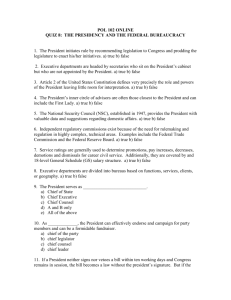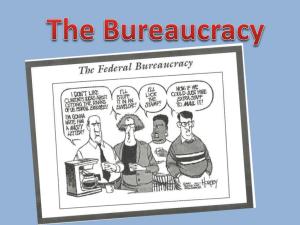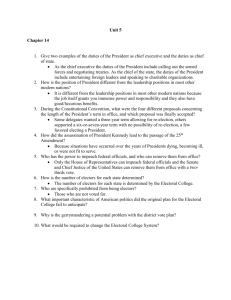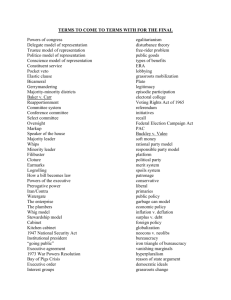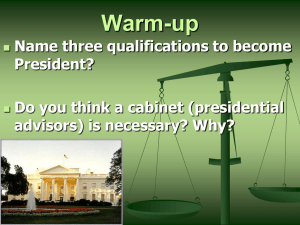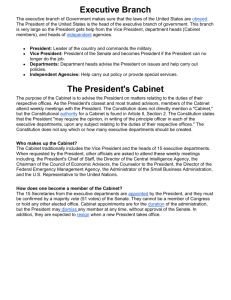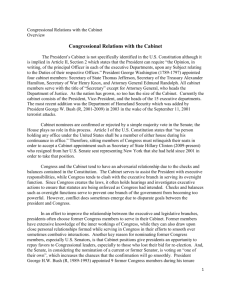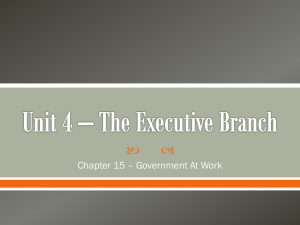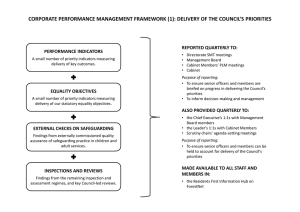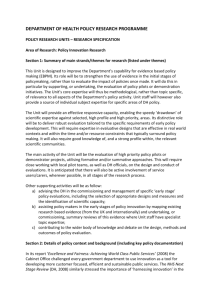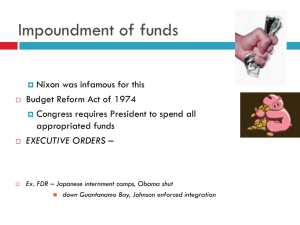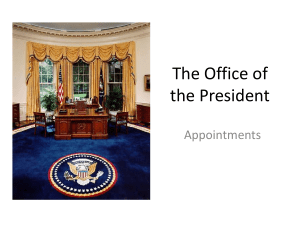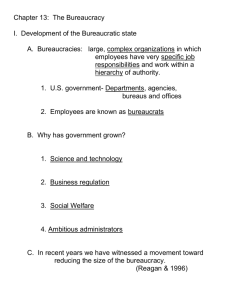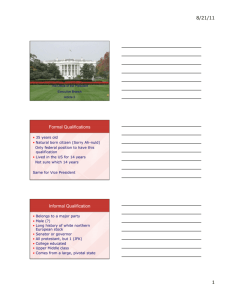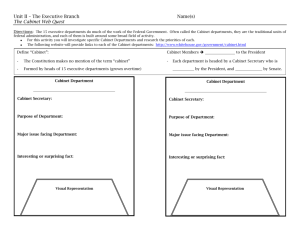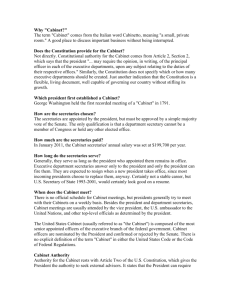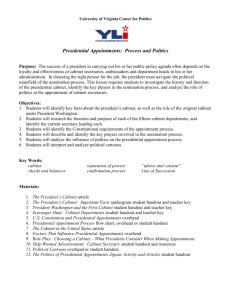The President as C.E.O.
advertisement
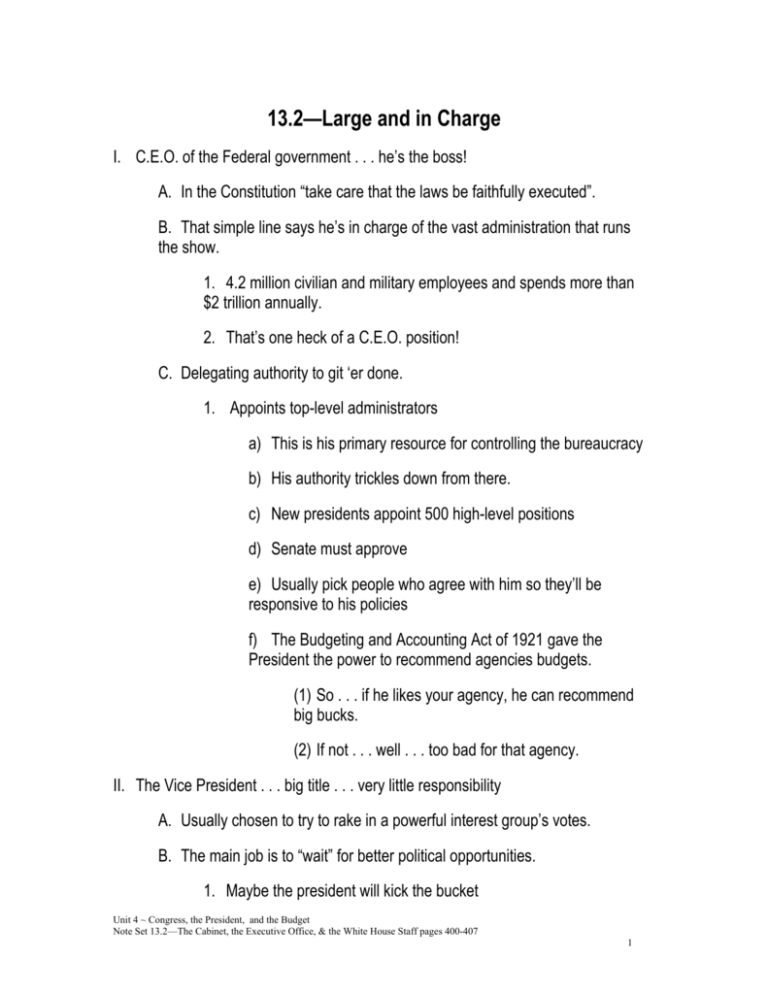
13.2—Large and in Charge I. C.E.O. of the Federal government . . . he’s the boss! A. In the Constitution “take care that the laws be faithfully executed”. B. That simple line says he’s in charge of the vast administration that runs the show. 1. 4.2 million civilian and military employees and spends more than $2 trillion annually. 2. That’s one heck of a C.E.O. position! C. Delegating authority to git ‘er done. 1. Appoints top-level administrators a) This is his primary resource for controlling the bureaucracy b) His authority trickles down from there. c) New presidents appoint 500 high-level positions d) Senate must approve e) Usually pick people who agree with him so they’ll be responsive to his policies f) The Budgeting and Accounting Act of 1921 gave the President the power to recommend agencies budgets. (1) So . . . if he likes your agency, he can recommend big bucks. (2) If not . . . well . . . too bad for that agency. II. The Vice President . . . big title . . . very little responsibility A. Usually chosen to try to rake in a powerful interest group’s votes. B. The main job is to “wait” for better political opportunities. 1. Maybe the president will kick the bucket Unit 4 ~ Congress, the President, and the Budget Note Set 13.2—The Cabinet, the Executive Office, & the White House Staff pages 400-407 1 2. If not, it looks good on the resume C. One of the few duties mentioned in the Constitution is that the V.P. presides as the President of the Senate and can break a tie in their votes. III. The Cabinet A. The head of each executive department, plus any additional government officials the president appoints (See Table 13.4 on page 402 . . . you need to be at least familiar with these departments . . . could you pick one out in a multiple choice?) B. The “Cabinet” is not mentioned in the Constitution, but every president has one. C. George Washington’s cabinet only had three secretaries 1. Secretary of State 2. Secretary of Treasury 3. Secretary of War D. But as important issues came up the Senate was asked to add cabinets 1. The State Department is responsible for making foreign policy and handling treaty negotiations 2. The two oldest cabinet departments are state and treasury 3. The newest cabinet department is homeland security E. Like everything in gov’t it has grown too. See table 13.4. IV. The Executive Office A. It IS the policymaking bodies of the President B. Established in 1939 C. It’s a BIG office, but consists of three major branches 1. The National Security Council (NSC) a) Links the president’s key foreign and military policy Unit 4 ~ Congress, the President, and the Budget Note Set 13.2—The Cabinet, the Executive Office, & the White House Staff pages 400-407 2 advisors. b) Provides info and recommendations on national security c) Advises the president in a national security crisis d) Coordinates all the agencies involved with national security e) Monitors all the national security programs to make sure they’re up to snuff 2. The Council of Economic Advisors (CEA) a) Has only three members, each appointed by the President b) They prepare the Annual Report of the C.E.A. for the pres. stating how we’re doing economically c) Also advise on economic inflation, unemployment, etc. 3. The Office of Management & Budget (OMB) a) Appointed by Pres. b) Prepare the President’s budget c) Review the legislative proposals from the cabinets BEFORE the president goes to Congress and asks for the bucks. d) They also have their noses buried deeply in the cabinets’ policies suggestions to make sure they align with the President’s goals. V. The White House Staff A. These guys are the key aids to the president and see him on a daily basis, serving as a liaison between the president and congress 1. White House Chief of Staff a) Top aid to the president b) Boss of the rest of the staff c) Manages the President's schedule Unit 4 ~ Congress, the President, and the Budget Note Set 13.2—The Cabinet, the Executive Office, & the White House Staff pages 400-407 3 d) Dubbed “the gatekeeper” because he decides who gets to meet with the President. e) Sometimes called the 2nd most powerful man in Washington 2. White House Press Secretary a) Gather info of what’s going on in the White House and the World b) Share it with the media 3. National Security Advisor a) Appointed by pres, but NOT approved by the Senate b) NOT connected with the Department of Defense c) Can therefore offer independent advice d) He’s the boss of “the situation room” and keeps Pres up to date of crisis. 4. The White House Office a) Lower folks b) Make travel arrangements, to managing the President’s calendar. B. The President has more influence on the staff than the staff has on the President 1. He picks them . . . that’s a HUGE influence over them! 2. He sets the tone Unit 4 ~ Congress, the President, and the Budget Note Set 13.2—The Cabinet, the Executive Office, & the White House Staff pages 400-407 4
